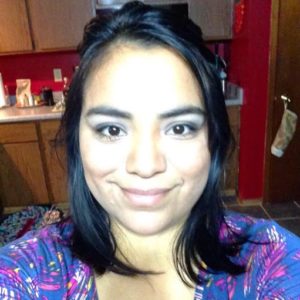 Alyssa Rodriguez attends First Mennonite Church in Iowa City, Iowa, and works as a free health clinic coordinator, serving uninsured and under-insured populations while also learning the ins and outs of motherhood with her beloved daughter, Zulema.
Alyssa Rodriguez attends First Mennonite Church in Iowa City, Iowa, and works as a free health clinic coordinator, serving uninsured and under-insured populations while also learning the ins and outs of motherhood with her beloved daughter, Zulema.
Beginning last summer, following the retirement of our co-pastors after 15 years of service, the church I belong to has been receiving assistance from an interim pastor.
Part of his job has been to dissect our church’s identity as we prepare for new leadership. He has done this by taking surveys and questionnaires, as well as conducting focus groups and open meetings. One survey indicated that our church is unsure about our faith community’s beliefs about homosexuality – answers varied so much that it was clear we have not come to a consensus on whether we would include LBGTQ individuals as active members in our community or not.
Another resulting survey specifically pertaining to this question contained language that offended (at least) one of our church members. Thankfully, she had the courage to speak up for the marginalized individuals in question. Through tears, she wondered why homosexual individuals essentially were equated to a “problem” in the survey. She questioned whether a family member of hers who is homosexual would receive the same welcoming, affirming treatment that her heterosexual son did growing up there. I too questioned the same for my relatives who are LGBTQ. I think about all the ways, prior to this moment, that our silence as a church around this question has marginalized people and failed to express God’s love to them and my heart gets heavy with regret and shame.
I admired the love this woman showed for not only her family member but for us, her church family.
She loved us all enough to raise a hard question and to speak up. Love is a hard conversation, and getting to the answers is not always easy. Love is having the courage to seek them out anyways.
—
“A few months ago, I had a panic attack in the church parking lot. I began to believe lies I told myself and felt unsafe being here, hence my recent lack of attendance. But I have come to realize those lies for what they were and have missed my church family and plan to return now.”
Before posting this message in our church bulletin recently; I shared my experience with my small, church women’s  group, as well as the reasons why I didn’t want to attend church but wanted to continue meeting with them. They lovingly responded, “How can we be there for you?” They showed up in ways that suited me at that specific time. They crushed my fears of risking the vulnerability it took to describe my pain and gave me hope. In addition to giving me a safe space to be vulnerable as I relived that moment of panic in the parking lot, they assured me I was loved and valued because they were willing to meet me where I was at in that moment.
group, as well as the reasons why I didn’t want to attend church but wanted to continue meeting with them. They lovingly responded, “How can we be there for you?” They showed up in ways that suited me at that specific time. They crushed my fears of risking the vulnerability it took to describe my pain and gave me hope. In addition to giving me a safe space to be vulnerable as I relived that moment of panic in the parking lot, they assured me I was loved and valued because they were willing to meet me where I was at in that moment.
My therapist worked with me through the realities of the panic attack I experienced and exclaimed,
“You keep showing up – for your daughter, for your work, for your life. I think that is important! And your church is a big reason why you have made it this far.”
She was right. Love is showing up for ourselves through the challenges, and it is also showing up for our loved ones as support during the challenges.
—
I am exhausted – emotionally and physically. Every molecule of my being yearns for more rest day after day. This is single motherhood to a very energetic toddler. My daughter’s new attempts at conquering language fill my heart with awe and joy as she utters commands to me when all I feel capable of doing is sleeping.
“Mom! Come! Sit!”
I sometimes don’t know how else to feel the love I have for her but to cry as I watch her in her peaceful sleep at night – hours later than I had hoped for.
Then I see her in daycare pictures, among her friends and my mind goes directly to the fact that she is the only child of color in the room.
My thoughts, saturated in my own personal experience as “the other,” cause me to fear for her future self as I read about a predominantly Latino high school basketball team in small-town Iowa getting yelled hateful things during a game, by its white opponents. Their words tainted by shameful political slogans like, “build a wall.”
I am unsure if anyone showed up or spoke up for them.
—
There have been many times when I have not shown up for myself, for loved ones and definitely times when I have remained silent during challenging conversations or have avoided them altogether. And each of these times resulted in a lost opportunity for vital, empowering growth.
Because the woman in our church spoke up, we have decided to delve deeper into questions of faith and homosexuality and how to more respectfully talk about it. Because I shared with my women’s group and eventually my church, I have been able to feel a greater tie to them, and have faith in their love for me and consequently, God’s love for me. Because I am pondering how to address the fact that our society’s conscience is drenched in hate now, before my daughter has even begun to fully understand what a conversation is, I feel confident that addressing the hard stuff will be possible and essential to her growth into a proud Latina.
When love is the motive behind us showing up and speaking up, it is God in action.
Here’s to speaking up and showing up in big and small ways each day.


